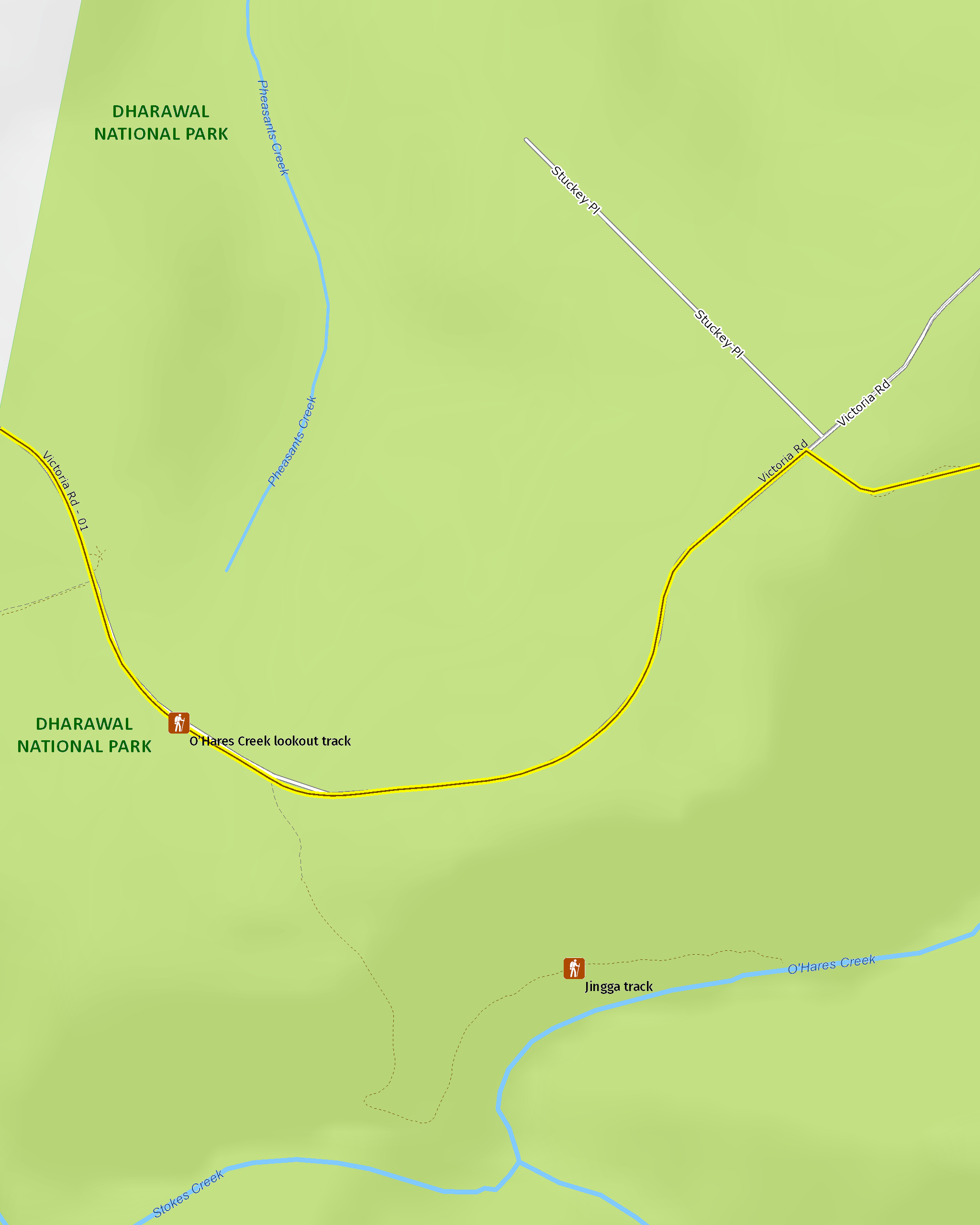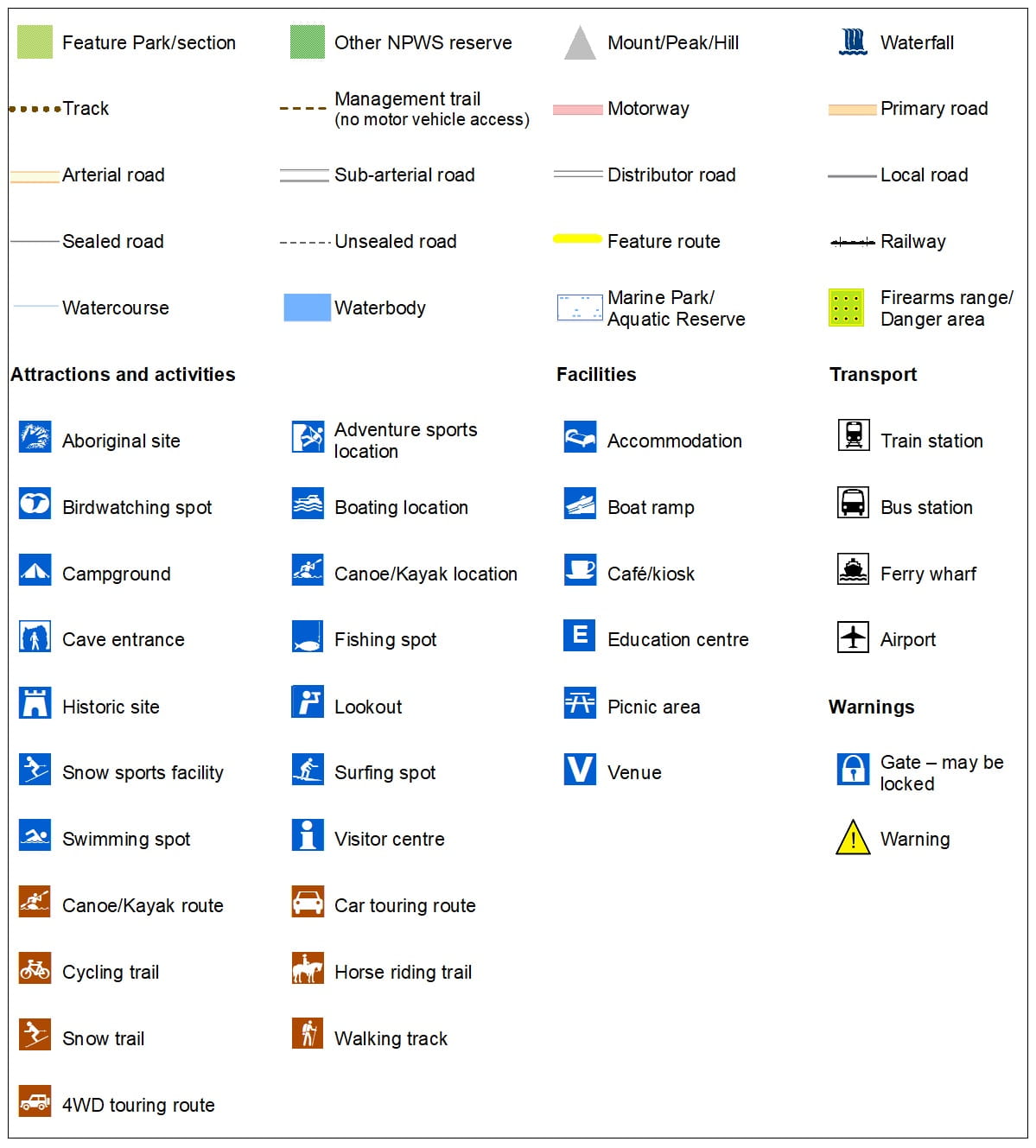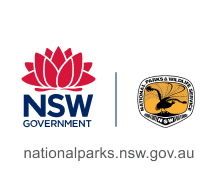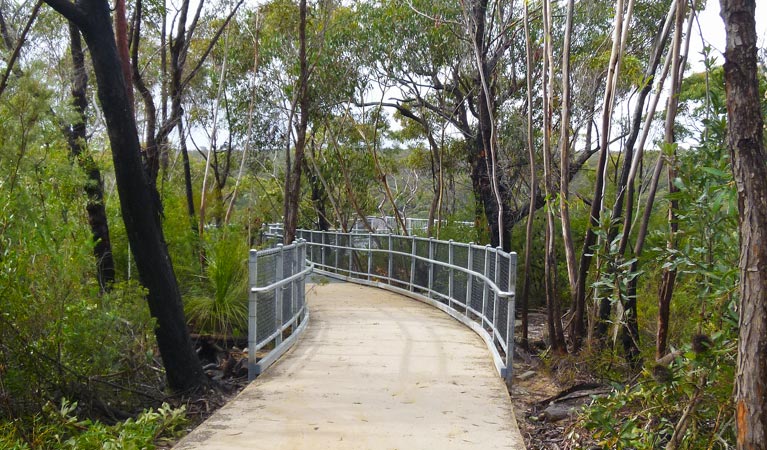O’Hares Creek lookout walking track
Dharawal National Park
Overview
Gather the family and head to O’Hares Creek lookout walking track in Dharawal National Park, south of Campbelltown and near Appin. It’s a great getaway with scenic views and birdwatching.
- Accessibility
- Easy
- Distance
- 2.8km return
- Time suggested
- 1hr 30min - 2hrs
- Grade
- Grade 1
- What to
bring - Drinking water, hat, sunscreen
- Please note
- Remember to take your binoculars if you want to go bird watching.
If you're looking for a quick getaway amongst pristine bushland without having to travel far, visit O’Hares Creek lookout walking track in Dharawal National Park, just south of Campbelltown. A flat and easy family friendly walk, enjoy a breath of fresh air on a day out, with birdwatching opportunities and scenic gorge views once you reach the end.
Following a flat bitumen track, keep an eye out for goannas and wallabies as you pass through open woodland full of tall scribbly gums and red bloodwoods. This walking track takes you to O'Hares Creek lookout, where you’ll discover deep gorges and a rugged landscape carved from Hawkesbury sandstone.
Spring is a great time to visit; the windswept heathland bursts with colour, attracting nectar-loving birds such as the new Holland honeyeater. Bring along a sandwich and if you’ve worked up an appetite, you can enjoy a light lunch while taking in the scenic views from the lookout.
Take a virtual tour of O’Hares Creek lookout walking track captured with Google Street View Trekker.
Map

Map legend

Local alerts
For the latest updates on fires, closures and other alerts in this area, see https://www.nationalparks.nsw.gov.au/things-to-do/walking-tracks/ohares-creek-lookout-walking-track/local-alerts
General enquiries
- National Parks Contact Centre
- 7am to 7pm daily
- 1300 072 757 (13000 PARKS) for the cost of a local call within Australia excluding mobiles
- parks.info@environment.nsw.gov.au
Park info
- in Dharawal National Park in the Sydney and surrounds and South Coast regions
Dharawal National Park is always open but may have to close at times due to poor weather or fire danger.
Visitor info
All the practical information you need to know about O’Hares Creek lookout walking track.
Maps and downloads
Learn more
O’Hares Creek lookout walking track is in Dharawal National Park. Here are just some of the reasons why this park is special:
A crucial catchment

O'Hares Creek catchment, on the Register of the National Estate is home to 17 vulnerable, rare or threatened species, and feeds the park's eucalypt forest, woodland, heathland, and sedgeland habitats. More than 500 plant species occur within the park, providing a home to a wide range of animals, including koalas and long-nosed potoroos, swamp wallabies, eastern wallaroos, New Holland honeyeaters and countless birds.
- Maddens Falls Enjoy scenic waterfall views at Maddens Falls lookout near Helensburgh, a great reward after a long bushwalk and the perfect place for birdwatching and photography.
- O’Hares Creek lookout walking track Gather the family and head to O’Hares Creek lookout walking track in Dharawal National Park, south of Campbelltown and near Appin. It’s a great getaway with scenic views and birdwatching.
Ancient landscapes

Dharawal National Park is the traditional land of the Dharawal Aboriginal people. Their long connection with this Country; the land and waterways, and the plants and animals that live in it feature in all facets of Aboriginal culture and are associated with Dreaming stories and cultural learning that is passed on today. The park protects several ancient Aboriginal sites, including drawings and axe-grinding grooves.
- Jingga walking track Jingga walking track, in Dharawal National Park, is a short yet challenging walk to a waterhole, offering picnic and birdwatching opportunities.
- Minerva Pool walking track Minerva Pool walking track winds through the traditional country of the Aboriginal Dharawal People. Enjoy a short bushwalk and then picnic at Minerva Pool, in Dharawal National Park, near Campbelltown.
Inspiring scenery

Prepare to be awed by the beautiful dense vegetation and rugged Hawkesbury sandstone that dominates the park's landscape. Set off on a bushwalk to discover eucalypt and shale forests, stunted woodlands and windswept heath. Explore further to find patches of rainforest and extensive sedgeland amongst the scenic terrain.
- 10B cycling trail 10B cycling trail in Dharawal National Park offers excellent easy cycling for enthusiastic bike riders, with a picturesque picnic spot along the way.
- Minerva Pool walking track Minerva Pool walking track winds through the traditional country of the Aboriginal Dharawal People. Enjoy a short bushwalk and then picnic at Minerva Pool, in Dharawal National Park, near Campbelltown.
- O'Hares Creek lookout For great gorge views near Campbelltown and Wollongong in southern Sydney, O'Hares Creek lookout in Dharawal National Park offers breathtaking scenery and birdwatching along a family-friendly walking track.
Park history

Dharawal was proclaimed a national park in 2012 following significant community involvement. Previously, it operated as a state conservation area and, before this, a water catchment area managed by Sydney Water. Seventy years of restricted public access has kept the area largely undisturbed, so pristine surroundings await you on your visit.
Plants and animals protected in this park
Animals
-

Swamp wallaby (Wallabia bicolor)
The swamp wallaby, also known as the black wallaby or black pademelon, lives in the dense understorey of rainforests, woodlands and dry sclerophyll forest along eastern Australia. This unique Australian macropod has a dark black-grey coat with a distinctive light-coloured cheek stripe.
-

Peron's tree frog (Litoria peroni)
Peron’s tree frog is found right across NSW. These tree-climbing and ground-dwelling Australian animals can quickly change colour, ranging from pale green-grey by day, to a reddish brown with emerald green flecks at night. The male frog has a drill-like call, which has been described as a 'maniacal cackle’.
-

Sugar glider (Petaurus breviceps)
The sugar glider is a tree-dwelling Australian native marsupial, found in tall eucalypt forests and woodlands along eastern NSW. The nocturnal sugar glider feeds on insects and birds, and satisfies its sweet tooth with nectar and pollens.
-

Southern boobook (Ninox novaeseelandiae)
The southern boobook, also known as the mopoke, is the smallest and most common native owl in Australia. With a musical 'boo-book' call that echoes through forests and woodlands, the southern boobook is a great one to look out for while bird watching.
-

Eastern water dragon (Intellagama lesueurii lesueurii)
The eastern water dragon is a subaquatic lizard found in healthy waterways along eastern NSW, from Nowra to halfway up the Cape York Pensinsula. It’s believed to be one of the oldest of Australian reptiles, remaining virtually unchanged for over 20 million years.

